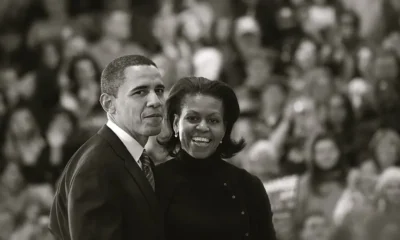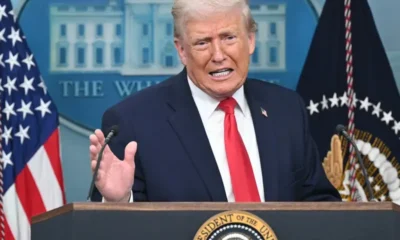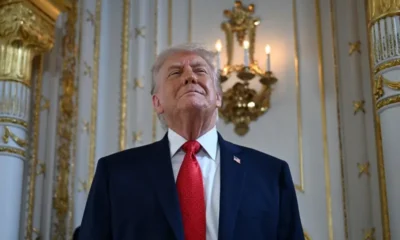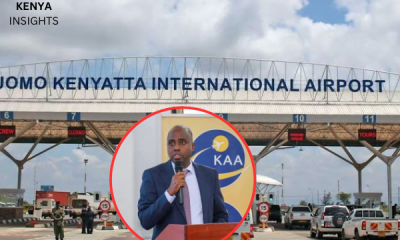Africa
What Trump Second Term Presidency Mean For Kenya And Africa
The shifting sands of U.S. foreign policy under Trump’s leadership present an urgent challenge for African governments.
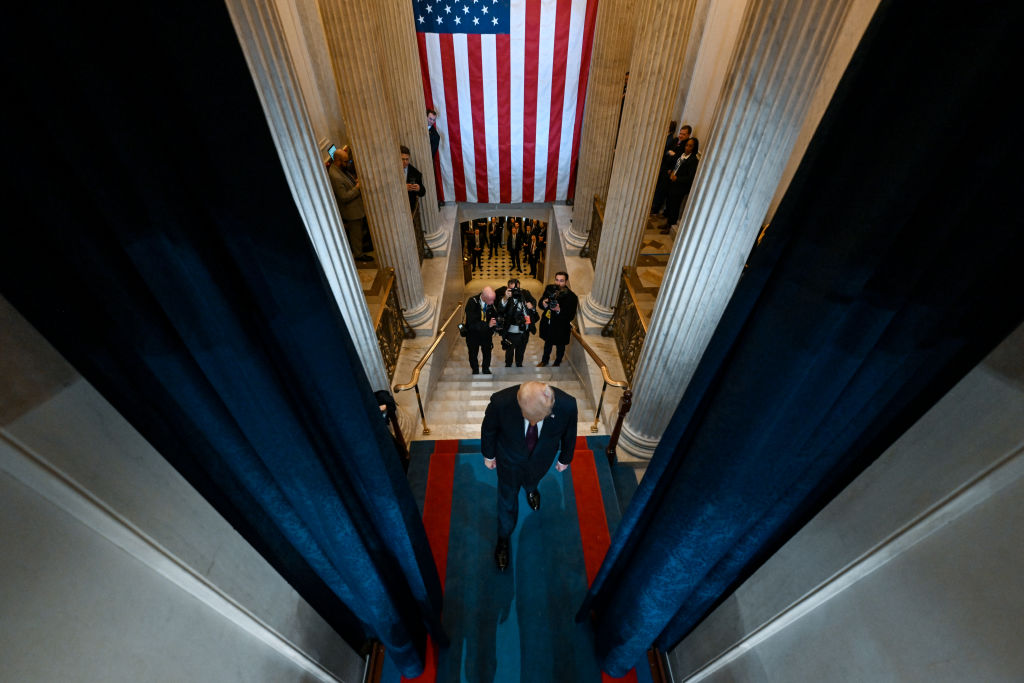
The inauguration of Donald Trump on Monday, January 20, 2025, for his second presidential term, has sent ripples across global markets and policymaking circles. While Kenya or any African country was directly addressed in his inauguration speech, the potential implications of these moves are profound.
– Executive Order on Aid:
-Upon taking office for his second term, President Donald Trump issued an executive order pausing U.S. foreign development aid for 90 days to evaluate its alignment with his administration’s policies. This directive affects all departments and agencies responsible for such aid, although the exact scope and affected entities remain unclear.
– Implications for Kenya:
– This decision comes at a pivotal time for Kenya, which had recently secured several aid-dependent agreements with the previous U.S. administration under President Joe Biden. During a state visit in May 2024, Kenyan President William Ruto and Biden signed deals focusing on:
– Climate and Clean Energy: The U.S.-Kenya Climate and Clean Energy Industrial Partnership aimed at promoting clean energy manufacturing, backed by a $60 million grant from the Millennium Challenge Corporation for climate-friendly public transportation in Kenya.
Kenya and the US struck a deal and launched a pact known as US-Kenya Climate and Clean Energy Industrial Partnership, targeted at lobbying and engaging international financial institutions and multilateral trust funds to identify mechanisms for mobilising investment for clean energy manufacturing and services.
As part of the climate deal between Dr Ruto and Mr Biden, it was agreed that a $60 million (Sh7,764,025,078.66) grant from the Millennium Challenge Corporation– is a bilateral United States foreign aid agency established by the US Congress in 2004—would fund a four-year programme focusing on transportation needs of underserved groups in Kenya, safer options for women and pedestrians, and climate-friendly public transportation.
– Security: Kenya was designated a Major non-NATO Ally (MNNA), the first in sub-Saharan Africa, enhancing defense trade and cooperation. This includes a $7 million initiative to modernize Kenya’s National Police Service and commitments to support anti-terrorism efforts in Somalia and peace in Sudan.
MNNA status is a designation under American law that provides foreign partners with certain benefits in the areas of defense trade and security cooperation.
Currently, 19 countries are designated as MNNAs by the US including; Argentina, Australia, Bahrain, Brazil, Colombia, Egypt, Israel, Japan, Jordan, and Kenya. Others are Kuwait, Morocco, New Zealand, Pakistan, the Philippines, Qatar, South Korea, Thailand, and Tunisia.
– Education: Biden’s administration committed $3.3 million to fund scholarships for Kenyan students to study STEM in the U.S. and an additional $500,000 to foster academic collaborations between Kenyan and American universities.
These developments now face uncertainty due to the aid freeze, potentially disrupting planned projects and partnerships in Kenya.
– Broader Impact on Africa:
– Trump’s regime may prove catastrophic for Africa, as experts predict cuts to U.S. aid, which currently amounts to about $8 billion annually, leaving millions—especially women and children—vulnerable to food insecurity, water scarcity, and the growing influence of authoritarian regimes, as well as Russia’s and China’s imperialist expansion.
– Trade:
– Trump’s policies will also have broader geopolitical implications. His administration’s “America First” approach emphasizes U.S. interests over international cooperation, which could lead to a reconfiguration of trade and diplomatic relationships. The spotlight is on whether the Trump administration will extend the African Growth and Opportunity Act (AGOA) beyond its 2025 deadline, as AGOA has been instrumental in fostering trade and economic development between Africa and the United States by providing African countries access to U.S. markets and allowing them to diversify their economies beyond raw materials.
Africa, which has increasingly become a focus of Chinese, Russian, and European influence, may navigate a more complicated geopolitical landscape, particularly in trade agreements, development aid, and investment. Trump’s focus on domestic interests could also impact U.S. foreign aid to Africa, further complicating the economic development of many African nations that depend on these resources.
The shifting sands of U.S. foreign policy under Trump’s leadership present an urgent challenge for African governments. For Kenya, the immediate concern is managing the economic fallout from potentially lower oil prices, but the broader challenge will be balancing energy policies and climate action in a rapidly changing global order. African countries must explore alternative economic models, emphasizing diversification away from fossil fuels and focusing on sustainability to prepare for the long-term effects of climate change and global energy market shifts.
Authoritarians, such as Uganda’s Museveni and Rwanda’s Kagame, are likely to seek closer ties, while democracies like South Africa could face strained relations due to their opposition to Israeli war crimes. People facing atrocities in expanding conflicts in the Horn of Africa and elsewhere are unlikely to see much support from the U.S. over the next few years.
– Health:
– Trump’s presidency could also spell trouble for global health agencies.
Trump has previously stated that he would cut funding to the World Health Organization (WHO) and the United Nations – agencies that collaborate with UNAIDS by leveraging support for the Global Fund.
In his speech, the former president, who is making a return to the White House, said that WHO had failed in its basic duty and must be held accountable, holding that during the Covid-19 pandemic, the global agency promoted China’s disinformation about the virus, which led to the spread of the respiratory viral disease across the globe.
Trump’s comments attracted a reaction from WHO chief Dr. Tedros Adhanom Ghebreyesus, who said it was “time for all of us to be united in our common struggle against a common threat.”
WHO works worldwide to promote health, keep the world safe, and serve the vulnerable, by ensuring that a billion more people have universal health coverage, protecting a billion more people from health emergencies, and providing a further billion people with better health and well-being.
Trump’s presidency is likely to have severe harm on reproductive health and women’s rights across Africa, putting millions of women and girls in danger. Compared with women in Europe, African women are more than 100 times more likely to die from abortion. Access to safe abortion is urgently needed to save their lives. Trump’s previous term emboldened regressive anti-women’s rights forces globally, weaponizing Christian right values against minorities. Trump’s Geneva Consensus Declaration, which denies an international right to abortion, now has 39 country signatories and spurs restrictive abortion laws.
An estimated 4.2 million African women resort to unsafe abortions each year, and 30,000 die as a result, according to the World Health Organization. At least 10% of the global total of abortions occur in Africa, the continent accounts for almost half of the world’s deaths from abortions, with one in 12 women dying from the procedure. For every death, 20 to 30 women have permanent damage to their uterus, cervix, fallopian tubes, intestine, or bladder. The United Nations Fund for Population Activities says that about 530,000 women die in pregnancy or childbirth every year, nearly half of them, 247,000, in sub-Saharan Africa.
Project 2025, a conservative blueprint, proposes re-imposing the global gag rule and limiting abortion access, which threatens African women’s health services that depend on U.S. funding. This may lead to increased injuries and deaths from unsafe abortions as resources for these services are cut. For advocates and feminists, Trump’s re-election makes their work harder, but they pledge to strategize, uphold hard-won rights, and stand in solidarity to combat harmful policies and protect women globally.
– HIV/AIDS:
– Programs like PEPFAR (the U.S. President’s Emergency Plan for AIDS Relief) and other health initiatives, vital to Africa, may also face cuts. There are 25.6 million people living with HIV in the African region. In 2022, about 380,000 people died from AIDS-related illness. HIV infection is often diagnosed through rapid diagnostic tests (RDTs), which detect the presence or absence of HIV antibodies. Without aid to vital programs, the number of deaths can be expected to rise.
Thanks to the support of the United States’ Global Fund and PEPFAR, millions of Kenyans have been able to access HIV/AIDS services. These programs have been a game-changer in the fight against one of the three killer diseases across Kenya and largely Africa. Under the HIV program, the donor supplies commodities, including testing kits and Antiretroviral (ARV) treatment. Through this support, at least 1.3 million people living with HIV in Kenya have been put on ARVs, according to data from the National Syndemic Disease Control Council (NSDCC).
With Trump’s return to the presidency, there are genuine concerns about a highly unpredictable funding environment.
“Trump’s presidency will impact not just PEPFAR, but also UNAIDS, the UN agency for HIV/AIDS, and the Global Fund to fight AIDS, TB, and Malaria. Trump’s ‘America First’ policy prioritizes domestic interests, which means funding for these global initiatives is likely to decline.” The Director of the National Empowerment Network of People Living with HIV/AIDS in Kenya (NEPHAK), Nelson Otwoma, said in an interview with local press.
He adds, “Trump does not appear likely to sustain the funding levels for PEPFAR and the Global Fund at current levels. This will directly impact Kenya.”
“His approach to funding, coupled with Kenya’s issues of corruption and procurement irregularities, puts us in a precarious position. Trump is a businessman who pays attention to such issues, and I do not believe Kenya is in his good books,” he continues.
“When they say ‘America First’, ‘Make America Great Again’ – they also prioritize American pharmaceutical companies. This could mean higher costs for ARVs since Kenya imports most of its ARVs from India, but Trump’s policies might push for the use of American pharmaceuticals, which could be more expensive,” says the representative of people living with HIV/AIDS.
The Global Fund is among the highest funders of Kenya’s health system. Kenya’s total commodity allocation for HIV services is Sh28.7 billion, of which Sh5.3 billion comes from the Global Fund and Sh3.3 billion from the Kenyan Government. Out of the Sh28.7 billion, the Global Fund allocates Sh4.6 billion for ARVs, while the Kenyan Government allocates Sh2.2 billion. However, there is a total shortage of Sh2.4 billion worth of ARVs.
PEPFAR funding for HIV commodities has been dwindling over the years, from Sh17 billion, Sh11 billion, Sh9 billion, to the current Sh7.3 billion.
– Climate:
– Trump’s decision to retreat from the Paris Agreement signals a retreat from multilateral efforts to combat climate change. This move could be catastrophic for African countries, given that climate-related risks such as droughts, floods, and food insecurity are becoming more frequent and severe in the region. While Africa contributes little to global emissions, it remains one of the most vulnerable continents to climate change. A rollback in global climate commitments would hinder progress in addressing these issues, leaving African countries to bear the brunt of environmental degradation without the support needed from global powers to mitigate its effects.
Trump’s climate policies also pose risks; Africa, disproportionately affected by climate crises, may suffer more if U.S. support wanes. Trump’s climate change denial is particularly worrying for Africa, which heavily relies on climate funds to tackle issues like water scarcity and food insecurity.
– Energy:
– Donald Trump’s pledge to unlock more of Kenya’s vast stores of energy will likely lower consumer price growth, according to Central Bank of Kenya Governor Kamau Thugge.
Kenya will analyze the impact of Trump’s promise to “‘drill, baby, drill,’” Governor Thugge told reporters while commenting on the domestic price-growth outlook. “If it results in lower fuel prices, then it’s also possible that that will contribute to lower inflation in the U.S. and also lower global inflation. And that could actually be a positive for us.”
The newly minted U.S. president signaled a push for domestic oil and gas production that may boost the nation’s output and ultimately lower prices. Brent crude slipped below $80 a barrel in London.
While Kenya announced an oil discovery in 2012, progress toward commercial production has stagnated, and the nation imports all the 5.5 million cubic meters of petroleum products it consumes. Kenya’s inflation is susceptible to the vagaries of weather at home and volatility of commodity prices abroad. The rate of price growth has declined and last year touched a 14-year low of 2.7%. It could climb to about 3.3% by March, according to the central bank.
Thugge said the monetary policy committee would gauge the effect of Trump’s new policies on inflation and in turn the Federal Reserve’s response.
Despite the dangers posed to Africa by the return of the Trump regime, a transactional, investment-focused relationship with Africa, prioritizing trade, direct economic partnerships, and reduced reliance on aid would likely be beneficial in the long term, if Africa can manage to diminish its consistent spiral towards kleptocracy and authoritarian rule. This approach contrasts with Biden’s focus on mutual cooperation, potentially allowing African countries more autonomy in democratic reforms and fostering economic self-reliance.
Kenya Insights allows guest blogging, if you want to be published on Kenya’s most authoritative and accurate blog, have an expose, news TIPS, story angles, human interest stories, drop us an email on [email protected] or via Telegram
-

 Grapevine2 weeks ago
Grapevine2 weeks agoAlleged Male Lover Claims His Life Is in Danger, Leaks Screenshots and Private Videos Linking SportPesa CEO Ronald Karauri
-

 Grapevine1 week ago
Grapevine1 week agoRussian Man’s Secret Sex Recordings Ignite Fury as Questions Mount Over Consent and Easy Pick-Ups in Nairobi
-

 Investigations4 days ago
Investigations4 days agoMulti-Million Dollar Fraud: Three Kenyans Face US Extradition in Massive Cybercrime Conspiracy
-

 Economy3 days ago
Economy3 days agoIran Demands Arrest, Prosecution Of Kenya’s Cup of Joe Director Director Over Sh2.6 Billion Tea Fraud
-

 Investigations2 weeks ago
Investigations2 weeks agoEpstein’s Girlfriend Ghislaine Maxwell Frequently Visited Kenya As Files Reveal Local Secret Links With The Underage Sex Trafficking Ring
-

 News2 weeks ago
News2 weeks agoState Agency Exposes Five Top Names Linked To Poor Building Approvals In Nairobi, Recommends Dismissal After City Hall Probe
-

 News2 days ago
News2 days agoTHE FIRM IN THE DOCK: How Kaplan and Stratton Became the Most Scrutinised Law Firm in Kenya
-

 Business4 days ago
Business4 days agoA Farm in Kenya’s Rift Valley Ignites a National Reckoning With Israeli Investment

